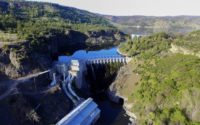A federal court in Brazil has ordered a halt to work on the $16-billion Belo Monte Dam under construction in the Amazon Basin. Judge Souza Prudente ruled on Aug. 14 that the project’s environmental and installation licenses had been granted without consultation with indigenous groups as required by the country’s constitution.
Officials with the consortium building the dam, Norte Energia, said they planned to appeal the ruling to the country’s Supreme Court. According to Prudente’s ruling, the consortium faces a fine of $240,000 per day if they are found in violation of the ruling.
The 11.2 GW run-of-river hydroelectric project on the Xingu River was awarded to the Notre Energia consortium in April 2010. The consortium’s primary shareholders are Brazil’s state-run power utility company Eletrobrás; its subsidiary Eletronorte; and the power generation and transmission company Compania Hidro Eletrica do Sao Francisco, known as CHESF.
Like many large-scale hydroelectric projects, it has proven a source of controversy.
President Dilma Rousseff has supported the project, noting that Belo Monte and other large hydroelectric dams are critical for Brazil meeting its growing energy needs. Environmentalists and human rights groups have backed a series of legal maneuvers to stop the dam’s construction saying it will displace thousands of native peoples.
The project is slated to begin power generation in 2015 and is currently 11% completed. Norte Energia officials said they are optimistic about overturning the decision but are concerned an overlong break in work would hamper the ability to complete necessary work prior to the start of the rainy season in December.
The project was approved in 2010 following a series of public hearings conducted by Brazil’s environmental enforcement agency IBAMA and the country’s governmental agency overseeing the protection of Indian interests, FUNAI. Norte Energia said more than 8,000 participants took part in the hearing, including several hundred indigenous leaders.
Prudente’s ruling states those consultations are invalid and only those carried out by the country’s congress carry rule of law. His ruling would require Brazil’s national congress to hold a series of public hearings with indigenous tribes affected by the Belo Monte project before re-issuing the licenses that would allow the construction to resume.
The recent ruling is only the most recent legal battle the project has faced. As of last February, the federal public prosecutor has filed 11 lawsuits seeking to stop the project. All have been overturned by higher courts.
In 2010 a judicial ruling halted the bidding process for the dam contract when the dam’s environmental license was revoked. A higher court overturned the ruling and the auction for the work proceeded. In February 2011, a federal judge issued an order blocking the project on environmental grounds; the decision was reversed a month later.
Also in 2011, the Inter-American Commission on Human Rights ordered Brazil to stop work on the project, saying neighboring countries were not sufficiently involved in the decision to build the dam. Brazil did not comply, saying the decision was a violation of the country’s sovereignty and cut off funding to the organization.




